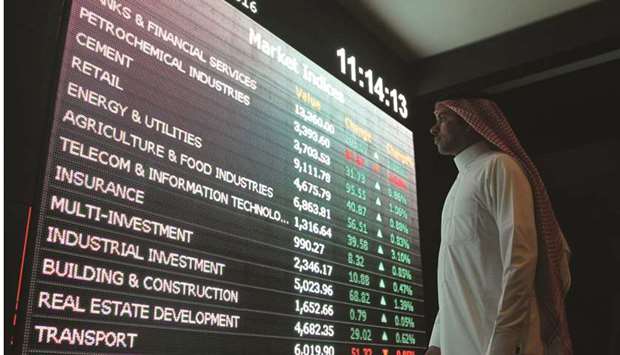Saudi
Arabia’s inclusion in emerging market stock benchmarks highlights the
role of largely opaque players in the kingdom’s market: government funds
that could be ready to push the sell button.
FTSE Russell will start
adding Saudi equities to its developing-nation gauges today, with peer
MSCI Inc following suit later. Inclusion is eventually expected to
trigger inflows from so-called passive buyers, whose assets track
benchmarks and must align with the gauges.
Other investors may hold
off because they see funds with links to the government, whose holdings
may have buoyed stocks during recent political turmoil, as primed to
offload stakes as newcomers enter.
International institutional
investors have suggested in meetings “that they are likely to take an
underweight position in the market, mainly on valuation grounds and
potential concerns about government-related entities selling into the
event,” Arqaam Capital analysts Jaap Meijer, Michael Malkoun and Nadine
Mdeihli wrote in a report on March 4.
The kingdom’s Public
Investment Fund is the biggest investor in Saudi Arabia’s $530bn stock
market, it has confirmed to Bloomberg, giving credence to speculation
from analysts, traders and investors who frequently said that funds tied
to the government support prices during times of high volatility.
Any
declines on the Saudi market’s benchmark index present “buying
opportunities which would be acted upon by some of the funds,” a PIF
spokesman said in an e-mailed response to questions.
Market
participants suspect that government-related funds swooped in to support
the market after the imprisonment of local billionaires at the
Ritz-Carlton Hotel in Riyadh in late 2017 and the international crisis
following columnist Jamal Khashoggi’s murder at the Saudi consulate in
Istanbul last year.
Some may see that as a convenient backstop to
selloffs, making up for the political risks that have unnerved investors
over the past few years. Not Mark Mobius.
“Many people are concerned
about the political environment,” Mobius, a veteran investor in
developing nations who set up Mobius Capital Partners LLP in 2018 after
three decades at Franklin Templeton Investments, told journalists in
Dubai last week. “It’s going to take a year or two before people really
begin to say that Saudi Arabia is the place we want to be.”
Passive
inflows could reach about $20bn once FTSE and MSCI complete their
inclusions, according to the Arqaam Capital analysts. Active managers
could bring in another $40bn. At the same time, as much as $21.8bn of
government-related funds is earmarked for sale throughout the index
inclusion process, said Meijer.
Those funds and early buyers
positioning themselves to sell will generate so much liquidity that “the
marginal investor will see little, if any, material benefit from
passive buying,” said Adam Choppin, an investment officer at FIS Group
in Philadelphia. “The absolute direction is harder to peg, but as a
relative trade, I expect Saudi to strongly underperform most emerging
markets” following recognition by index compilers, he said.
The Saudi
stock exchange and the local regulator have worked since 2015 to earn
the upgrades, allowing investors from abroad to trade directly,
introducing new corporate-governance rules and adopting global
accounting standards.
But ultimately, there’s little visibility on
what PIF-related funds own, according to FIS Group’s Choppin. So while
he thinks they’ll be net sellers, there’s no telling the “scale of their
selling.”

An investor monitors a screen displaying stock information at the Saudi Stock Exchange (Tadawul) in Riyadh (file). Saudi Arabia’s inclusion in emerging market stock benchmarks highlights the role of largely opaque players in the kingdom’s market: Government funds that could be ready to push the sell button.
